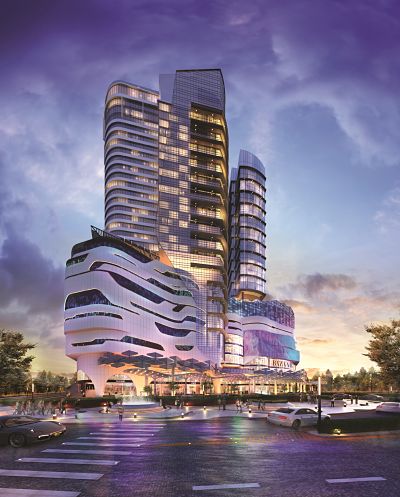|
Catalist-listed Terratech Resources, following a reverse takeover (RTO), will see its marble-production business synergise with the property projects of Capital City Group.
This RTO is different in that the legacy business is not marked for divestment. |
 Capital City: Its retail mall -- which will have thematic floors reflecting various countries -- will open in early 2018, followed later by its hotel and serviced suites/apartments. Artist's impression What underpins this ambitious project?
Capital City: Its retail mall -- which will have thematic floors reflecting various countries -- will open in early 2018, followed later by its hotel and serviced suites/apartments. Artist's impression What underpins this ambitious project?
Mr Siow Chien Fu, CEO of Capital City, at a recent investor presentation, highlighted various significant projects that have transformed Johor Baru in the fields of education, tourism, oil & gas and technology.
And its Senai Airport, notably, has started welcoming direct flights from Guangzhou, China.
Such developments will generate lots of human traffic for Capital City which sits in a central location in Johor Baru and which has relatively little competition.
Johor Baru, as Mr Siow noted, has fewer than 10 "good malls" and no new one in the planning stage currently -- despite the massive residential developments that have sprouted in JB in recent years.
 Siow Chien Fu, CEO of Capital City Group.
Siow Chien Fu, CEO of Capital City Group.
Photo by Leong Chan Teik KSL City is the busiest mall in Johor and the only integrated development to date.
Opened in 2011 and designed by Mr Siow himself, it inspired him to conceive the idea of Capital City.
The business model enables it to fast-track its growth with relatively low capital. Here's how it works:
Instead of paying outright for land -- through cash reserves and bank borrowings -- Capital City seeks to enter into joint ventures with landowners whose land parcels are "market-ready".
Upfront, the total land cost and payment period are agreed upon between buyer and seller. Capital City will pay the land owner progressively, using an agreed percentage of the proceeds from development units sold. (There is no fixed formula and terms vary from project to project).
Capital City will use the balance proceeds as working capital to pay for construction costs, etc.
(In the case of Capital City, the landowner is a Bursa Malaysia-listed company, Gadang Holdings).
The circular to Terratech shareholders says 63.3% of the retail mall units available for sale have been sold, and 28.6% of the serviced suites have been taken up. Serviced apartments, totalling 690 units, have yet to be launched.
|
(RM ‘000) |
FY2014 |
FY2015 |
Y2016 |
1Q2016 |
1Q22017 |
|
Revenue |
1,936 |
37,095 |
81,637 |
14,866 |
27,680 |
|
Gross profit |
803 |
27,874 |
62,584 |
11,448 |
22,721 |
|
Net profit |
(13,693) |
11,490 |
42,912 |
6,972 |
14,708 |
|
Net margin (%) |
-- |
31.0 |
52.6 |
46.9 |
53.1 |
The financials of Capital City, as stated in the RTO circular to shareholders of Terratech, look attractive:
♦ FY2015 was the first year of profitability after the project was launched for sale in 2014.
♦ Revenue has been rising since, and is booked according to the percentage-of-completion method.
♦ Net profit margins in the 40-50% range are simply superb, thanks largely to the absence of significant interest cost as the company has negligible borrowings.
| Key events |
2017 |
|
Date of EGM |
21 April |
|
Suspension of trading |
25 April |
|
Completion of compliance placement |
4 May |
|
Resumption of trading |
5 May, 9 am |
|
Source: Terratech Circular |
|
Capital City is the first project and will be followed by two other projects that the developer has recently bagged: an integrated mall with a F&B theme in Austin, Johor, and a wellness hub in Sitiawan, Perak.
Mr Siow said the business model will be expanded to encompass other types of development such as industrial parks and landed homes in Malaysia and in regional countries such as Cambodia, Vietnam and Laos.
See also: Siow Chien Fu: Ready to list property development business through RTO







